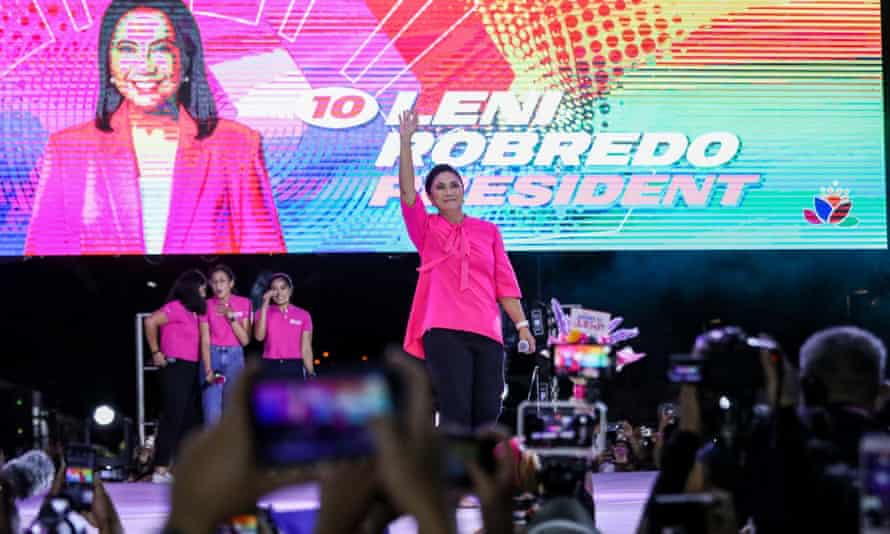Voters in the Philippines will go to the polls for a presidential election that pits frontrunner Ferdinand Marcos Jr, the son and namesake of the late dictator, against a human rights lawyer who has promised a transparent government.
Marcos Jr, known as “Bongbong”, whose authoritarian father plundered billions of dollars from the state and presided over rife human rights abuses, has maintained a strong lead in opinion polls in the run-up to Monday’s vote. If elected president, it would mark an extraordinary rehabilitation of one of the country’s most controversial political families.
Marcos is trailed in the polls by Leni Robredo, the current vice-president and a human rights lawyer who has advocated for marginalized groups. As vice president – a position elected separately from the president – she has frequently clashed with president Rodrigo Duterte, and has condemned his so-called “war on drugs’, which she has killed as many as 30,000 people according to some estimates, and prompted an investigation by the international criminal court.
Marcos, whose backers have used social media to rebrand the family and whitewash history, has a significant lead in opinion polls. He is the preferred candidate of 56% of voters, according to a recent survey by Pulse Asia. Robredo, behind him, is favored by 23%.
However, analysts say it is possible such surveys have overestimated Marcos’s lead, pointing to the large turnouts at Robredo’s rallies.
“The reality could be that it is a very close race,” said Ronald Mendoza, the dean of Manila’s Ateneo school of government. “Hopefully [the result] will be settled sooner because that lends itself to a more stable transition.”
The Philippine police and military said on Sunday they were on high alert ahead of the vote. “We are ready for any contingencies,” the armed forces chief, Lt Genl Andres Centino, told a media briefing. “We are committed… to ensure that we have a secure, accurate, free and fair election tomorrow,” he said.
On Saturday, the last day of campaigning, Robredo supporters filled the streets of Makati, in the national capital region, with a sea of bright pink, the campaign’s trademark colour. “We have the right to a future with dignity, and we have the duty to fight for it. We have learned that nothing is impossible,” Robredo told crowds of supporters.
Robredo is up against two of the country’s most powerful political families: the Marcoses, and the Dutertes. The president’s daughter, Sara Duterte, is running alongside Marcos Jr for the vice-presidency, though Duterte has not endorsed a presidential candidate.
The Marcos camp has shunned TV debates and avoided questions from media outlets it deems unfriendly. Instead, the family and its backers have used social media to reach voters, especially those who do not remember martial law, at a time when thousands were killed, tortured and arrested. A network of accounts portray the Marcos period as a time when the country was prosperous and orderly, inundating news feeds with false claims about the period. Marcos Jr has denied the presence of any coordinated online campaign.
Robredo’s camp, by contrast, has been driven by volunteer activists who have gone house to house trying to win over undecided voters. It is a strategy that is not usually applied on such a wide scale in presidential elections in the Philippines, and its impact is unclear, analysts say.

“It’s something of a puzzle for us political scientists and observers of elections, whether this new thing in this campaign – that voluntarism, the house-to-house campaigns will matter in the final results of the elections,” said Prof Maria Ela L Atienza, who teaches political science at the University of the Philippines.
Social media may give the impression that people have a strongly held preference, but this isn’t necessarily reflective of society, she added. “When we look back to previous elections, there was a huge percentage of people in the exit poll saying that they only decided weeks before the election, or even during the actual day of the elections,” she said.
Sign up to First Edition, our free daily newsletter – every weekday morning at 7am BST
People are swayed not by loyalty to a political party, but by other personal factors, including the extent to which they feel a connection with candidates.
Marcos, whose slogan is “together we shall rise again”, has campaigned with a message of unity and hope. At his final rally on Saturday, he told supporters: “We will reach the day that when we join forces, when we again face the world and shout to our friends and wave our flag, we will be proud to say we are Filipinos.”
Atienza said the level of engagement among supporters of candidates is comparable to 1986, when Marcos Sr called snap elections – an attempt to provide his mandate amid growing pressure at home and abroad. His claim of him to have won, amid reports of cheating and fraud, led to the People Power Revolution, which overthrew his rule of him.
It put the Philippines on “the imperfect road to democracy”, said Atienza. The small gains since then could be threatened by the prospect of another Marcos presidency, she added.
www.theguardian.com
George is Digismak’s reported cum editor with 13 years of experience in Journalism